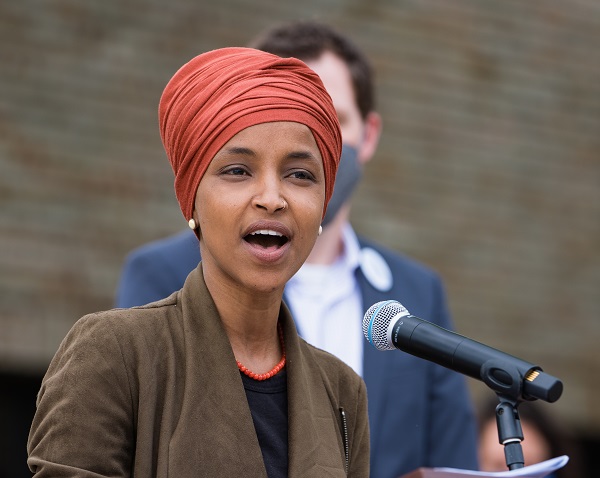U.S. Rep Ilhan Omar (D-MN) ratcheted up tensions between nuclear powers India and Pakistan last week.
She did this by visiting the disputed region of Kashmir under the auspices of Pakistan’s newly elected prime minister Shehbaz Sharif, whom she met with during a recent trip to Pakistan. Her visit to Pakistani controlled portion of Kashmir, known as Azad Kashmir, which is claimed by India, elicited an angry response from the Indian Foreign Ministry.
“We have noted that she has visited a part of the Indian union territory … that is currently illegally occupied by Pakistan,” Foreign Ministry spokesperson Arindam Bagchi said. “Let me just say that if such a politician wishes to practice her narrow-minded politics at home, that’s her business. But violating our territorial integrity and sovereignty in its pursuit makes this ours and we think the visit is condemnable.”
Kashmir has been the source of bloody conflict between India and Pakistan since the 1947 partition that created the two countries, which became nuclear powers in 1967 and 1998 respectively. Numerous Islamists groups in the U.S. are exploiting the Kashmir conflict to incite their supporters, Oren Litwin warned in the Daily Wire in 2019.
After her visit to Kashmir, Omar declared that “I don’t believe that [Kashmir] is being talked about to the extent it needs to in Congress but also with the [U.S.] administration.”
This isn’t the first time Omar has embroiled herself in the Kashmir controversy. In 2019, Omar, a member of the Foreign Affairs Committee, attended a hearing of the Subcommittee on Asia, of which she was not a member, to malign Aarti Tikoo Singh, a Kashmiri Hindu exiled by jihadists, who called attention to the decades-long issue of Pakistan backing Islamist terrorists in the region. Omar called Singh a “mouthpiece for a government,” and called her credentials and objectivity into question.
During her interrogation, Omar used rhetoric strikingly close to that used by U.S. Islamist organizations and their fellow travelers, such as Stand with Kashmir, a shadowy organization that lionizes terrorists in the region, and the Islamic Circle of North America (ICNA) a franchise of South Asia’s Jamaat-e-Islami, political Islamist group that played a prominent role in the Bengali genocide of 1971.
Omar’s visit came during a time of upheaval in Pakistan. Less than two weeks ago, now-former Pakistani Prime Minister Imran Khan was ousted from his position after a vote of no confidence, an event which Khan blamed on a popular false conspiracy theory that involved the United States being angry at Khan for unwisely meeting with Putin the day the war in Ukraine broke out, and thus working to boot him from his job.
One commentator juxtaposed Omar’s visit with Khan with allegations that there was a U.S. plot to oust him. “How dumb do you need to be, to be running a whole campaign based on an ‘American Conspiracy’ for being voted out, terming anyone in opposition who met people from the US gov. as conspirators…. and doing the same?” asked Pakistani columnist and U.S.-based PhD student Ali Moeen Nawazish.
Khan’s supporters were more charitable. Shireen Mazari, a member of Khan’s party, PTI, and the Federal Minister for Human Rights under Khan, known for wild conspiracy theories about France’s treatment of Muslims, pointed out that Omar was merely a member of Congress, not part of the Administration, and doubled down on the “conspiracy” talk.
Others simply wondered about Omar’s stance on the alleged “regime change.” At the meeting, Omar reportedly expressed admiration for Khan’s “work for Muslims globally,” indicating that Khan will remain a force in Islamist circles and their fellow travelers after his ouster.
This shouldn’t be a surprise. In 2019, Khan addressed a conference held by the Islamic Society of North America (ISNA) a group founded, not by South Asian Islamists, but by Muslim Brotherhood supporters, urging them to raise the issue of Kashmir. Khan also sent Pakistani forces to Azerbaijan to fight alongside Azerbaijanis and Turks against Armenian Christians. He’s clearly had his eyes on a worldwide movement for some time.
It is unclear who paid for Omar’s trip to Pakistan, a state that has become a leader in promoting Sunni Islamism, and in influencing American politics through domestic Islamist franchises and other proxies. State Department Officials denied paying for the trip, and Omar’s office isn’t talking.
